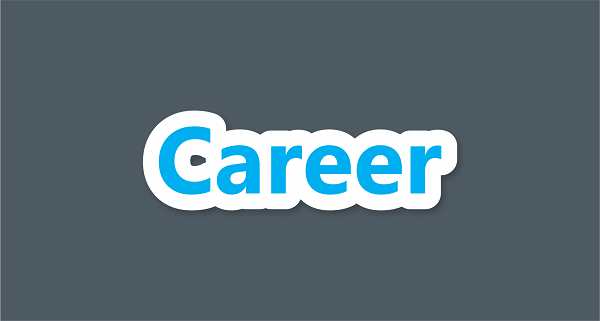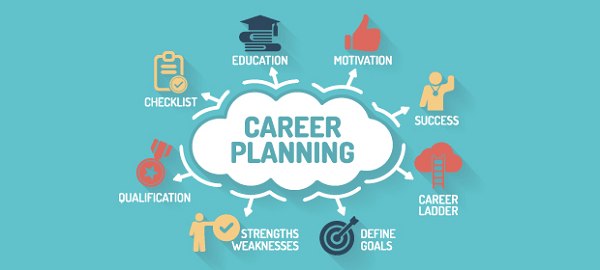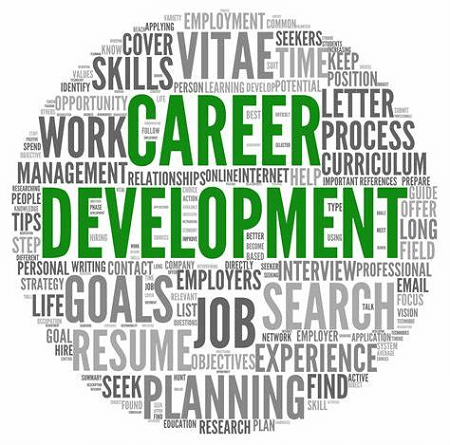Career DefinitionThe term "career" defines a person's professional path and the many jobs and tasks they have during their working life. An individual's education, skills, experiences, and aspirations impact the ongoing personal and professional growth process. A career is a journey someone follows to advance their skills, knowledge, and competence in a certain sector; it is not merely a job or a succession of jobs. It's a dynamic, ever-evolving process that calls for development, flexibility, and constant learning. 
From entry-level jobs to senior positions, there are several career phases, and each step calls for a particular set of abilities, knowledge, and competencies. Finding contentment and meaning in one's job are important components of a successful career and advancing to high positions. People need to be aware of their objectives, interests, and strengths to have a successful profession. They must spend money on their education and training to get the knowledge and abilities required to succeed in their chosen career. One can progress their career through networking and developing ties with mentors and coworkers. A career reflects not only one's path but also the larger social, economic, and cultural environment. The development of new technology, the shifting demands of employers and clients, and the changing nature of work can all influence a person's career path. A career is a lifelong learning, development, and progress path that calls for constant work and dedication to reach success and happiness. Historical Changes in CareersBy the late 20th century, several variations (especially in the range of viable jobs) and more general education had made it possible to plan (or design) a career: In this way, the careers of the career counselor and adviser have developed. Therefore, professional identities have been hyphenated or hybridized to represent this change in work ethic. Richard Florida, an economist, observes this pattern both generally and more, especially among the "creative class". 1. Career ManagementCareer the board or career improvement depicts a person's dynamic and deliberate administration of a career. Thoughts of what involves "career the executive's abilities" are portrayed by the Diagram model (in the US, Canada, Australia, Scotland, and Britain) and the Seven C's of Advanced Career Proficiency (explicitly connecting with the Web abilities). 
Key abilities include the capacity to consider one's career momentum, research the work market, decide if training is vital, track down openings, and make career changes. 2. Career ChoiceOne of the most crucial choices a person can make is their career. It can affect their general happiness and well-being, influence their financial security, and mold their destiny. When choosing a professional route, one must carefully assess their interests, talents, beliefs, and objectives. When choosing a career, one should take into account several variables. Personal interest comes first. A profession one is enthusiastic about should be chosen since it may inspire employees and give them a sense of direction in their work. This may be accomplished via investigating one's interests, giving back, and job shadowing. 
Skills and talents should also be taken into account. People should select a profession that fits their inherent skills and characteristics. This may be accomplished by evaluating one's talents and shortcomings and selecting a profession that matches those strengths. Other significant considerations are values and personality. People ought to select a job that fits their ideals and personality. For instance, a person who places high importance on work-life balance can select a profession with flexible work hours. Another factor to consider is the job market. Choosing a career with job openings and growth potential is important. This can be done by researching job trends and industry demand. Finally, education and training should be considered. Individuals should choose a career that aligns with their education and training. If additional education or training is needed, it is important to consider the cost and time commitment required. Choosing a job is a lifelong decision; it is vital to remember this. Throughout their lives, people may need to choose a variety of careers. Being open to new chances and continuing one's education and professional development in one's area is crucial. Choosing a career is a crucial decision that needs a thorough evaluation of one's interests, abilities, beliefs, and aspirations. People may make well-informed decisions that result in a meaningful and successful career by taking the time to consider these criteria and study employment prospects. 3. Career ChangingManaging one's career, including professional changes, is essential. Individuals and the work market will change throughout a lifetime, and it is expected that many people will change jobs. The National Longitudinal Survey of Youth conducted by the U.S. Bureau of Labour Statistics in 1979 revealed that people between 18 and 38 will work more than 10 jobs. 
There are different motivations behind why individuals should change their careers. In some cases, a career change can come as the consequence of a long-expected cutback, while at different times, it can happen out of the blue and all of a sudden. A Right Management poll suggests the following reasons for shifting careers.
4. Career SuccessScholars and famous expounding on careers often utilize career success. It alludes to the degree and manners by which an individual can be depicted as successful in their functioning life up until this point. In the 1950s and 1960s, people often worked for one or two companies throughout their careers, and success was determined by the organization and gauged by promotions, pay raises, and prestige. The career stage model developed by Donald Super served as an example of such typical careers. According to Super's linear career stage model, organizations with established organizational structures are the setting in which careers develop. Moving up the organizational structure was done by those who wanted bigger external benefits. Early career success might raise dissatisfaction later, particularly when an individual's self-esteem is restricted in their career or accomplishments. Professional success will generally come from the get-go in certain fields, like logical examination, and later in different fields, like education. Earnings can be represented either in absolute terms (such as how much a person makes) or relative ones (such as how much a person makes compared to their beginning wage). Earnings and status are two examples of objective success criteria, where "objective" refers to the fact that they can be independently confirmed and are not only a matter of opinion. Numerous eyewitnesses contend that careers are less unsurprising than they used to be because of the high speed of financial and mechanical change. This implies that the career of the board is all the more the obligation of the individual as opposed to their utilizing association because a "task forever" is a relic of past times. This has placed more accentuation on emotional standards of career success. These incorporate work fulfillment, career fulfillment, the balance between serious and fun activities, individual accomplishment, and steady work with one's qualities. An individual's evaluation of their career success will probably be impacted by close examinations, for example, how well relatives, companions, or peers at the everyday schedule have done. Several types of professional capital impact the degree and nature of job success an individual experiences. These include cultural capital (having skills, attitudes, or general knowledge to operate effectively in a particular social context), economic capital (money and other material resources that permit access to career-related resources), and human capital (demonstrable abilities, experiences, and qualifications). Social capital refers to the breadth and depth of personal contacts a person can draw upon. Human capital also includes demonstrated abilities, experiences, and qualifications. 5. Career Development PlanningFor each person, career planning entails a process that involves self-awareness of their requirements and aspirations for fulfillment in their personal lives and their careers. The variety of occupations people will pursue throughout their lives is influenced by the fact that every person's experiences are unique. Long Term Career "Long-term Careers" are defined as long-term commitments that last throughout an individual's life. The individual will use their specialized skill sets, which they have acquired throughout their life, to work towards retirement. For instance, someone would have to go through a consistent process of finishing medical school and working in the medical field until they retire. Steady-state careers may also be described as continuing in the same position within an organization for a lengthy period while becoming specialized in the field of knowledge. A retail manager with extensive experience in sales would have the knowledge, skills, and personality attributes required to manage non-managerial staff and organize the tasks that subordinates must accomplish. 
As each new open door entails a more significant impact of responsibility and dynamic power in a hierarchical atmosphere, a career that necessitates fresh urges of growth and duty after tolerating new tasks is referred to as a "Direct Career." A linear career path entails moving up the executive food chain when promoted. For instance, a more elevated level administration position in an organization would involve greater obligation concerning the direction and designation of assets to successfully and productively run the organization. Mid-level chiefs and high-level directors/Presidents would be alluded to as having straight careers. Their upward development in the authoritatively ordered progression would involve more responsibilities regarding arranging, controlling, driving, and sorting out administrative undertakings. Short Term Career "Short-term Careers" and "Spiral Careers" refer to those who take up temporary or short-term jobs. A person who frequently changes jobs and has tasks that differ from one another is said to have a transitory career. An illustration of a transitory career move is a fast-food employee who quits the Business after a year and transitions to an office environment to work as an entry-level bookkeeper or administrative assistant. The employee's prior employment role's requirements will not be met by their current position's requirements in terms of knowledge or abilities. 
A spiral career is any series of short positions that are non-indistinguishable from each other yet add to expertise working on a particular property that people will acknowledge over their lifetime. Numerous people can go through slight career advances or acknowledge momentary provisional labor in a similar work field to foster different ranges of abilities required for them to prevail in a hierarchical climate. For instance, a person with a degree in Business recruited to 'extend the board' in one region of a division can be elevated or moved to finish one more job in a similar office to deal with 'showcasing'. 6. Career Development PerspectiveThe personal initiatives individuals pursue in their job growth are largely focused on their beliefs, ambitions, and interests and the path necessary to satisfy these aspirations. A certain amount of control and a sense of urgency over a personal job development path may necessitate a person pursuing further education or training to meet their objectives. According to John L. Holland's six professional pillars, investigative, realistic, artistic, social, enterprising, and conventional, a person's career path will rely on the pillar they may exemplify. An individual's job growth and possibilities may be better matched the more they are conscious of their personality type. 
The variables that impact a person to settle on appropriate career objective choices likewise depend on the ecological elements that are straightforwardly influencing them. Choices depend on shifting perspectives influencing the balance between serious and fun activities, wanting to adjust career choices to their qualities, and the level of excitement or development. Through the Human Resources functions of Training and advancement, a business organization may successfully offer possibilities for career advancement. The major objective of training and development is to make sure that organizational goals are strategically planned in a way that can be modified to meet the needs of a changing environment. The Human Resources section of an organization is in charge of writing detailed job descriptions that include all duties and responsibilities for each position as well as chances for work rotation, transfers, and promotions. Employing chiefs are liable for guaranteeing that the subordinates know about their work undertakings and guaranteeing the progression of correspondence stays productive. In connection, chiefs are likewise liable for supporting and establishing an ideal workplace to work in to cultivate the drawn-out learning, improvement, and ability obtaining of their subordinates. Thusly, the degree to which a supervisor embraces the designation of preparing and fostering their representatives plays an important figure in the maintenance and turnover of workers.
Next TopicCentral Bank Definition
|
 For Videos Join Our Youtube Channel: Join Now
For Videos Join Our Youtube Channel: Join Now
Feedback
- Send your Feedback to [email protected]
Help Others, Please Share










